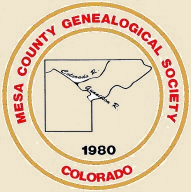Educational Opportunities for Members
The Mesa County Genealogical Society (MCGS) offers a variety of educational programs at our evening meetings. These include webinars, member presentations, and share sessions.
Educational Opportunities for the Community
First Friday
Available to MCGS Members as well as the public, one of these sessions may help you with your research problem.
Experienced MCGS members are available to assist you.
The sessions are held at the Mesa County Main Library, Fruita Branch, Palisade Branch, and Clifton Branch on a rotating basis.
Register at www.mesacountylibraries.org
Click on the 'Events' tab then, when the calendar opens, choose the first Friday of the month you wish to attend.
Scroll to 'Genealogy Research Help' and click the 'Register!' button.
A free informative Beginning Genealogy 'First Friday Packet' can be found here [note: this is a 10 page pdf document].
Books to Get You Started
Val D. Greenwood. The Researcher's Guide to American Genealogy. Baltimore, Maryland: Genealogical Publishing Co., Inc.
Emily Anne Groom. Unpuzzling Your Past: A Basic Guide to Genealogy. White Hall, Virginia: Betterway Publications, Inc.
Elizabeth Shown Mills. Evidence: Citation and Analysis for the Family Historian. Baltimore, Maryland: Genealogical Publishing Company
Donald A Ritchie. Doing Oral History. New York, NY: Oxford University Press.
Cynthia Hart and Lisa Samson. The Oral History Workshop. Workman Publishing Company
Blain T. Bettinger, The Family Tree Guide to DNA Testing and Genetic Genealogy. Cincinnati, Ohio: Family Tree Books.
"How to" Websites
International Society of Genetic Genealogy Wiki
A beginners guide to genetic genealogy.
"Family History for Beginners" on the familysearch.org website is a great resource for those of you starting out in family history research along with some good hints for the more advanced topic of 'Research Analysis'.
National Genealogical Society (NGS)
Although not 'free' the courses offered by the NGS are some of the best for beginning or continuing your genealogy research education. Highly recommended for beginners is the 'Foundations in Family History' courses (101, 102, 103).
As an education and resource partner for the National Genealogical Society, this site is filled with interesting and helpful information.
Genealogical Proof Standard
The Genealogical Proof Standard (GPS) is a guideline for establishing the reliability ("proof") of a genealogical conclusion with reasonable certainty. It is important within the genealogical community for clearly communicating the quality of research performed, such as by a professional (or amateur) genealogist.
- Conduct a reasonably exhaustive search for all information that is or may be pertinent to the identity, relationship, event or situation in questions.
- Collect and include in your compilation a complete, accurate citation to the source or sources of each item of information used.
- Analyze and correlate the collected information to assess its quality as evidence.
- Resolve any conflicts caused by items of evidence that contradict each other or are contrary to a proposed (hypothetical) solution to the question.
- Arrive at a soundly reasonable, coherently written conclusion.
- It does not require or ensure proof beyond the shadow of a doubt but the objection that "something else could have happened" is insufficient to discredit the conclusion.

